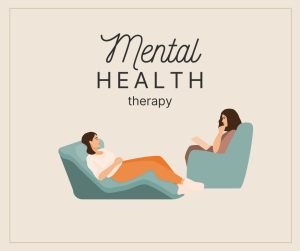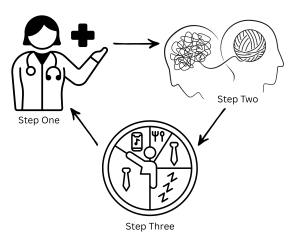The quicksand dragged you down, and you crashed on rock bottom. You don’t want to stay here, but you don’t know how to get out. What do you do?

Healing from a mental breakdown, or hitting rock bottom, works best if you try a whole-person approach to treatment. Many things went into creating the problem, and since your body is so interconnected, you cannot just treat one isolated part to heal completely. You need to change and adjust several things – from your physical health to your mental health to your lifestyle. As you lay on rock bottom, it can feel overwhelming. So start with one small step and move forward from there.
Step One: The Medical Side
A good place to start is with your primary care provider (PCP). This medical specialty is always the first person you should go to for any new physical or mental health concerns.

A PCP has been trained to look at all of you as a whole, and not just individual parts. Their job is to help you stay healthy and, when not, they work with you to get you back to the best health you can be in.
During your visit, your PCP will not only discuss with you your current mental health condition, but also your physical condition. As a nurse, I knew that chronic illnesses cause mental distress. What I did not know is that any change in your physical body affects your mental health. Improving your physical health often improves your mental health, while any illness or injury can hurt your mental health.
It wasn’t until I worked in a primary care office that I learned that acute illnesses – flu, covid, appendicitis, etc – can cause mental health struggles just like chronic conditions can. Thankfully, these mental illnesses often get better once you physically get better.
Your PCP will work with you in finding a treatment for your mental health concerns. On top of that, they will investigate if you happen to have any physical cause for your mental illness. They may order blood tests, imaging, physical therapy, or send you to see a specialists, among other things, based on what they find.
Just like your physical health affects your mental health, your mental health can affect your physical health.
Determining what is going on and what the best treatment plan is can require more than one visit. Often, your treatment plan will need to be adjusted as you start to make progress in healing. Make sure you follow your provider’s instructions, not only in the medications you should take, but in the changes you need to make in your lifestyle and seeing a therapist if they advise one.
Step Two: Therapy

Just like you see a Cardiologist for heart problems, you can see a specialist for your mental health. These practitioners are known as psychiatrists, psychologists, therapists, social workers, etc. Depending on what type of mental healthcare you need will determine the type of specialist you will see. Sometimes, you need more than one type of provider, if you need special medication ordered, or if you need an intense, in-person treatment phase.
While most primary care providers do not refer to mental health specialists, they can help advise you on where to look. The first place to start is with your insurance company. They will have a list of therapists in the area that they will cover, or how much they will help you pay for therapy. Sometimes your work’s employee assistance program (EAP) offers a list of therapists or will help cover the cost for a few visits. Speak with your HR representative to see what is available.
Where I live, we struggle to keep good therapists. Some of our patients struggle to find a therapist they both like and who does the type of therapy needed. Thankfully, there are therapists online.
No matter how you see your therapist, it is important to be honest with them. Lying or saving face does not affect them, but it will affect you. Without honesty, your care will not meet your needs and you will not get better.
Step Three: Lifestyle
The amount of time you spend with your providers is minuscule compared to the time you spend away from them. You need to apply the things you learn from your therapist, take the medication your PCP orders for you, and follow both providers’ instructions on what changes you need to make in your lifestyle.

The concept of lifestyle in healthcare can be hard to define. It encompasses so much, literally your whole life. Lifestyle includes:
- Who you live with
- Where you work
- Who you work with
- What you eat or don’t eat
- What habits do you have – smoking, vaping, consuming alcohol, marijuana use, drug use, etc
- Your education level
- Where you live
- How much money you have
- Etc., Etc
Lifestyle is the way you live your life every day. We know that parts of it can affect our health – diet, exercise, and substance use are the biggest examples. What most people don’t realize is that all the other parts of your life also affect your health.
- If you don’t have good health insurance, you may put off going to the doctor’s until you absolutely have to. Meaning, you might be sicker when you see them, and it may take longer to feel better.
- Money may be an issue, and you have to decide whether to pay for your medication or pay rent.
- You may have someone in your life who encourages you to be unhealthy or who causes increased stress in your life.
Working with your doctor and therapist can help you identify ways your lifestyle affects your physical and mental health. They can also take it a step further and advise you on how to change your lifestyle to remove these things or people. Often, a slow, stepwise approach is used.
Bringing it all together
It is scary and painful to hit rock bottom. Often, the way out is not very clear, and motivation can be hard to find. There are people out there who can help you. You may not know where to start, who can help you, or even what help is available.

Remember that your mind and body are closely connected. You cannot heal one without healing the other. Starting with your primary care provider is a good place to start. Their focus is on all of you, and they take an integrated approach to treating any physical or mental health concerns you may have. Add in a therapist to help you work through any mental health issues you may have. Finally, make changes to your lifestyle to help implement and continue the healing that your PCP and therapist have helped you start.













